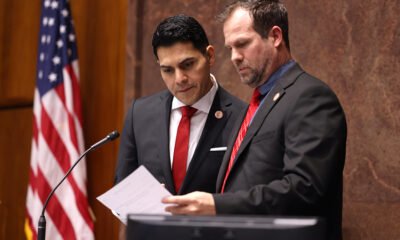DEI
Gov. Hobbs Strikes Down GOP Immigration, City, and DEI Bills

On May 2, Arizona Governor Katie Hobbs vetoed 23 bills, continuing a trend that has seen her reject a total of 75 bills in the current legislative session.
Among those vetoed were several Republican proposals focused on immigration, gun laws, and diversity, equity, and inclusion (DEI) initiatives.
One significant veto came in response to a proposal by Sen. David Farnsworth, R-Mesa, aimed at cutting state funding for any community college or university offering courses deemed unacceptable. This included topics like institutional racism and gender identity.
Farnsworth cited his experience in a cultural diversity course as motivation for the bill. However, Hobbs emphasized the critical role that state universities and community colleges play in Arizona’s economy and workforce development.
“Jeopardizing their state funding attacks stability and could lead to negative effects on the state’s workforce,” she asserted in her veto message.
In addition to Farnsworth’s bill, Hobbs rejected other measures, bringing her total vetoes within this legislative session to 75—exceeding last year’s total.
Notably, she also dismissed Sen. David Gowan’s proposal to impose personal fines on elected officials for violating laws restricting local regulation of firearms, labeling it unnecessary.
“There are existing mechanisms to challenge city ordinances,” Hobbs stated, in line with the views of legal advocates who argue that current laws are adequate to address such issues.
Further, she vetoed a proposal forcing state officials to assist in federal immigration enforcement, repeating her commitment to uphold both the U.S. and Arizona Constitutions.
Hobbs noted that local decisions should determine immigration policies rather than directives from Washington, D.C.
In another related veto, Hobbs rejected a bill requiring county jails to share personal information of specific detainees with federal immigration authorities, saying it imposed undue burdens on local law enforcement.
She also turned down multiple bills addressing unemployment benefits, arguing that proposed changes would create unnecessary delays and costs for both workers and the state.
Security concerns influenced her decision to veto legislation allowing online access to voter registration rolls, as she feared misuse of personal information.
Hobbs further rejected two groundwater regulation proposals, expressing disappointment in their failure to address pressing water policy challenges in Arizona.
Other bills vetoed include measures on virtual currency investments by state retirement funds, restrictions on DEI initiatives in hiring, and a proposal affecting transgender amendments to birth certificates.
In summary, Hobbs remains steadfast in her approach to governance, emphasizing the need for clarity, practicality, and local control in matters affecting Arizona.

















